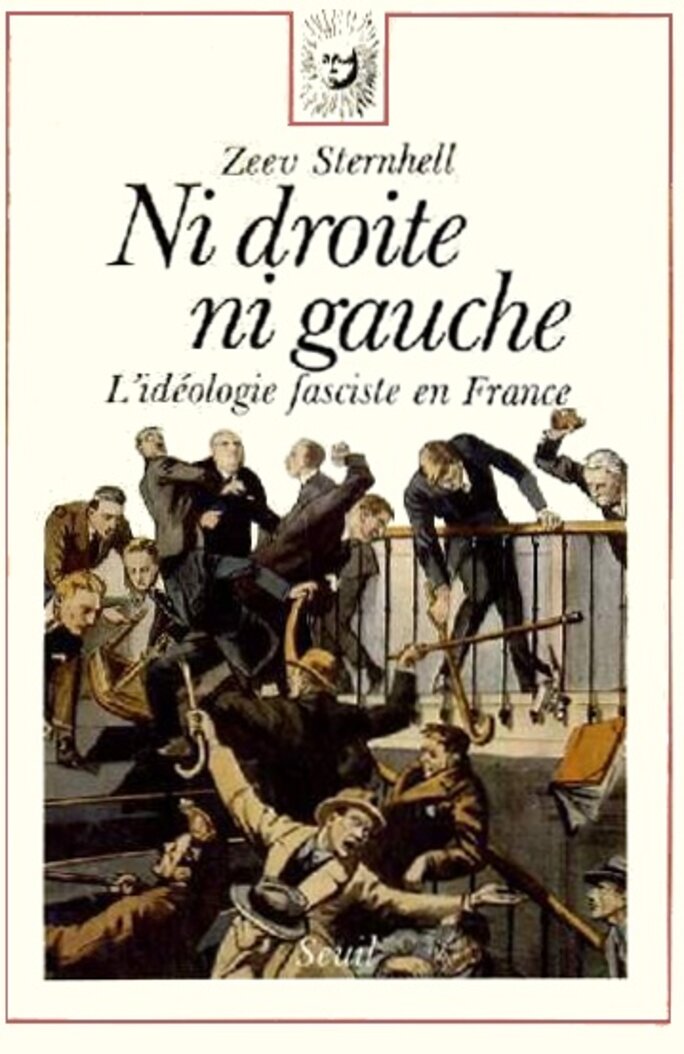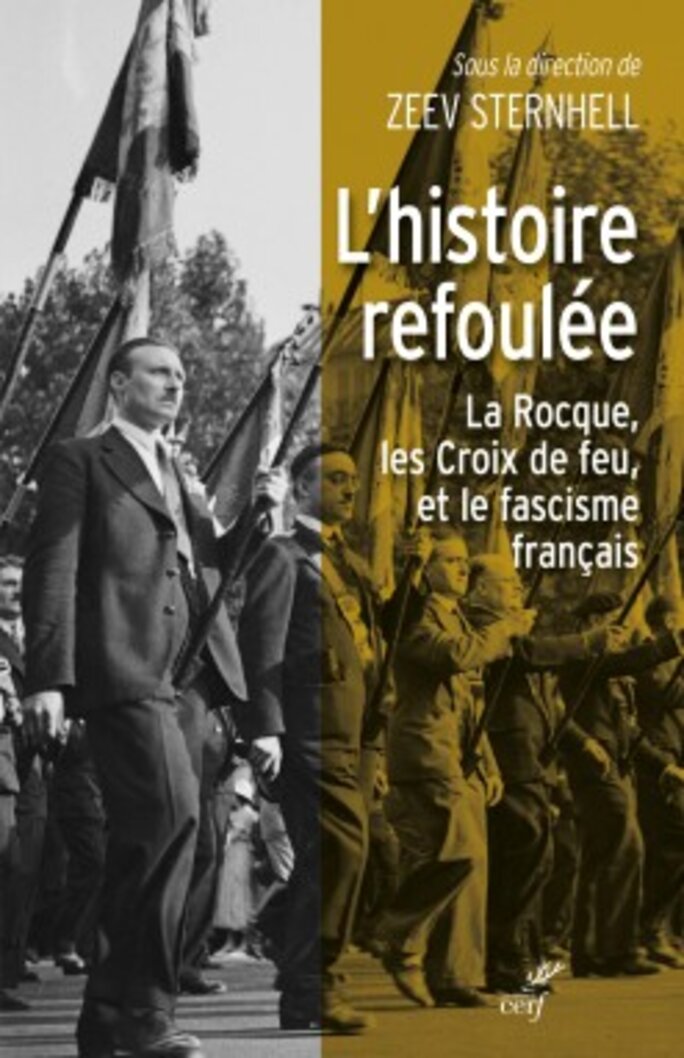The Israeli historian Zeev Sternhell died on Sunday June 21st 2020, at the age of 85. Born into a Jewish family in the historic town of Przemyśl in south-west Poland, in April 1935, his life could have stepped out of the pages of a novel. At the age of seven, after his mother and sister had been killed by the Nazis, he was smuggled to the nearby city of Lwów – then in Poland, now called Lviv and in Ukraine – where he was brought up as a Catholic and was able to survive the rest of the war. After the end of World War II he went to live and study in France, attending school in Avignon in the south of France, before moving to the new state of Israel in 1951 when aged 16.

In Israel Sternhall became an historian and in the 1960s he was asked by Ethiopian emperor Haile Selassie to direct the university at Addis Ababa. Later in his career he became head of the Department of Political Science at the Hebrew University of Jerusalem and was a world authority on fascism and its roots.
However, a simple recital of his life does not give a full picture of Zeev Sternhell, who was a gentle man even though he spoke loudly because of his deafness. He was a man of scruples, and a loyal friend, in particular to Jean-Marie Borzeix, the former director of the French public radio station France Culture. Because his painstaking research caused outrage, he was seen by some as an extremely dangerous firebrand. But nothing could have been further from the truth. In writing about fascism and the extent of its roots in France, the historian was simply daring to look at the bad side of the notion of French exceptionalism. In other words, he did not study it as the land of human rights, which brought the Enlightenment and democracy to a benighted world, but instead as the France of those foul passions that, having first been trialled in the colonies, turned the West savage: the French form of fascism.
As far as Zeev Sternhell was concerned the gradual convergence of intransigent nationalism and revolutionary syndicalism over the years 1885 to 1914 produced a political cocktail that was as original as it was explosive: anti-Enlightenment and anti-democratic.
In 1983 the historian's 'Ni droite ni gauche. L’idéologie fasciste en France'- published in English as 'Neither Right Nor Left: Fascist Ideology in France' – led indirectly to the death of the French philosopher and writer Raymond Aron. Driven by a notion of national unity, Aron had gone to the law courts in Paris to give evidence in favour of his friend and fellow philosopher Bertrand de Jouvenel (1903-1987) and subsequently collapsed and died. Jouvenel had sued Sternhell for defamation over the latter's claims that he had had fascist sympathies in the 1930s and 1940s. Yet Sternhell had revealed the truth: Jouvenal had helped boost the influence of Nazism by interviewing Hitler uncritically in 1936, praising “Nazi good-heartedness” and insisting that the Chancellor of the Third Reich was advocating a “foreign policy wholly oriented towards friendship with France” and that he was a simple man who “spoke gently, reasonably and nicely, with humour”.
Jouvenel had also been a member of the Parti Populaire Français (PPF), the fascist and anti-Semitic party led by Jacques Doriot, and in 1941 he published a book whose title, 80 years on, feels very contemporary: La Décomposition de l’Europe libérale. ('The Breakdown of Liberal Europe'). This was thanks to the generosity of his good friend Otto Abetz, who was the pro-Hitler German Ambassador in Paris. Abetz, incidentally, had been expelled from France in June 1939 after claims he bribed two French newspaper editors to pen pro-German articles.

Just as Raymond Aron had been blind in his defence of Jouvenal – going so far as to deny that no one could have grasped the reality of Nazism in 1936, even though he himself had been one of the first to detect its toxicity – so, too, French history academia ranged up against Zeev Sternhell. This was despite the fact that the Israeli historian came from the same great French and Parisian historical tradition. At the end of the 1960s he was awarded a PhD from Sciences Po university in Paris, under the guidance of historian Jean Touchard, for his thesis on French novelist and politician Maurice Barrès and French nationalism.
This thesis was the start of historical research that would take up practically the rest of his academic life. An expert on nationalism, Sternhell went on in the 1980s to assert that – contrary to the historiographical doctrines of Sciences Po – French fascism did exist. And that it was a cultural phenomenon with deep roots, and with a coherent ideology that came from the social and political upheavals confronted by Europe when it was unable to find a response to these problems either in liberal capitalism or revolutionary socialism. It is fair to say that the controversy unleashed by this thesis, carefully documented in several books, has still not disappeared.
For in the meantime Touchard had died in 1971 and his exact contemporary, René Rémond, who was also born in 1918, and was an expert on the French Right, took over his mantle. Rémond had undeniable qualities as an historian, even if he could be verbose. But he also harboured something of a guilty conscience, as he had spent the early part of the war preparing for his entry to the elite Paris university the École Normale Supérieure while others in the Resistance movement risked their lives. For example, the historian Marc Ferro, who was born in 1924, and whose Jewish-Ukrainian mother died in the Holocaust, spent the war fighting in the Vercors range of mountains in south-east France rather than studying in Paris.
As a good Catholic René Rémond privately accepted this reproach but could not bear reminders of his passive culpability being paraded in public. And Sternhell, who retrospectively sounded the alarm with his books, was a form of living condemnation of France in the 1930s and early 1940s. This was intolerable for the hushed, cosy and grand world of the Fondation Nationale des Sciences Politiques and its teaching arm Sciences Po where Rémond had four loyal disciples: Michel Winock, Serge Berstein, Pierre Milza and Jean-Noël Jeanneney. This 'quadroon' as General de Gaulle might have put it, made life hard for Sternhell. They used every means at their disposal to block him and bring him down to size.
Michel Winock won first prize in this as in 1983 he was the editor at Seuil who published 'Ni droite ni gauche. L’idéologie fasciste en France' and turned publicly against the very book he was supposed to be launching. The best way to understand the position of a certain set of French historians is to read an introduction in 1984 by Jean-Pierre Rioux in the periodical XXe Siècle to an attack on Zeev Sternhell by another historian, Serge Berstein. He starts off by acknowledging the merits of the Israeli historian, contrasting him – though without naming him - with the philosopher Bernard-Henri Lévy and his 1981 work L’Idéologie française.
“We regard Sternhell as a real historian, one of those who goes to the source material, reads it carefully and shows their worth: as a researcher who, in their haste to reach a new understanding, is free to take the risk of producing a questionable book yet without ostracising themselves from the scientific community or sullying any flag,” started Rioux. But he then came to the core of his argument which amounts to little more than dogma: “What [Serge Berstein] says, following strongly in the tradition of René Rémond, Raoul Girardet and Jean Touchard, about the impermeability of French political culture to fascism, needed to be said.”
To sum up, Sternhell's objectors say that the historian worked too hastily and was not content merely to come up with some variation on a theme already dictated by the grandees of French history. And they rejected his heresy against what had become an article of faith: that there could not possibly be the slightest linkage between France and fascism.
Paris has often been home to received wisdoms that refuse to go away. One was that the French Republic had no connection with Vichy France, the regime that was set up under Nazi occupation of the country during World War II. That received wisdom survived until the 1995 speech given by President Jacques Chirac when he apologised on behalf of France for the round-up of Jews in Paris as the Vél d'Hiv stadium in 1942. The current cliché, as Mediapart has pointed out, is that racism is the opposite of the Republic and that the Republic is the antidote to racism.
This kind of intellectual Maginot Line does not survive first scrutiny but those who fight rearguard battles in France never give up. And Zeev Sternhell became a martyr to this form of intellectual trench warfare. This warfare uses fairly basic rhetorical tricks that we can sum up in this case like this: if our national wounds have to be scratched then it is for the French to do it – though that consists of a quite unseemly kind of masochism or self-loathing – and is not to be carried out by external victims of fascism, who try to heap too much baggage on France's back.
There seems to be a perverse form of logic at play here, suggesting that to have the calm approach necessary for historical studies, it is better to have a limited amount of guilty national conscience than the raw suffering of the persecuted who are looking for the origins of their own pain in our national story. In short, the victims are distorting what they claim to be studying, as they lack perspective and balance.

Yet Zeev Sternhell had the kind of spirit and energy that can hit the nail on the head, with all due respect to the French method of going round in circles with a cravenness that passes for measured virtue. This debate still has relevance today; the Israeli historian studied the shifting forces at work and in doing so undermined the sometimes already shaky foundations of the French Republic. Meanwhile his detractors, in smug denial, insisted that all those “short-lived surges” of fascism in France had come from “very marginalised environments”, that these “fashionable demonstrations” and “short-lived successes” of fascism turned out to be “powerless to obliterate over the long term the depth of democratic culture in France”, to cite Berstein.
Yet Sternhell broke this droning consensus which was based on an obsession with classification. Through constantly polishing and refining their little academic compartments, following on from René Remond's identification of three strands of the political Right in France, some French academics ended up no longer being able to identify the beast that could not be pigeon-holed. Sternhell went so far as to show that not only was France not immune to fascism, it was itself a source of the infection.
Just as Raymond Aron had looked on the initial works of the German-American philosopher and political theorist Hannah Arendt with a slightly scornful and paternalistic suspicion – before relaxing his stance in the face of the international recognition of her work that was impossible to counter - so French historians opposed to Sternhell adapted a scornful approach to his claims about France and the origins of fascism. “What comparison is there between Mussolini's squadre [editor's note, the paramilitary groups often known as the Blackshirts], Hitler's Sturmabteilung [editor's note, the original Nazi paramilitary often known as the SA] and the La Rocque's 'dispos',” asked Michel Winock, referring to the paramilitary group created by French right-wing leader François de La Rocque.
Once again his critics beat around the bush, made lists and zoomed in on the differences, while Zeev Sternhell raised the only issue worth raising: fascism did indeed appear in France, before it went on to proclaim itself as an idea new to Europe.
In a story by Russian fable writer Ivan Krylov a man who is obsessed with details, boundaries and classifications goes to the Natural History Museum, and when he returns enthuses about the cockroaches and butterflies he has seen. He is then asked if he saw the elephant. “To tell the truth, I didn't notice the elephant,” replies the man who is simply in love with the taxonomy of the animal world. Too many French historians have adopted this approach, while Zeev Sternhell showed them the traces of the fascist elephant. That is why the work of the historian, who died on Midsummer's Day 2020 aged 85, deserves our gratitude. Through his endless labours he has constantly shown us that one can be just without necessarily having to blindfold ourselves, unlike the goddess Themis or Lady Justice, blindfolded images of whom adorn the court buildings of a France that sometimes only sees what it wants to see.
-----------------------------------------------------
- The French version of this article can be found here. With additional material from the article by René Backmann here.
English version by Michael Streeter


